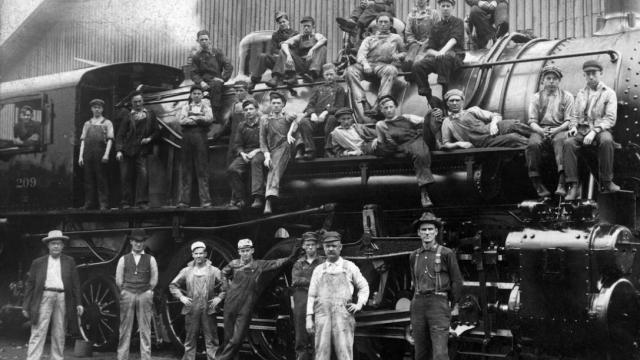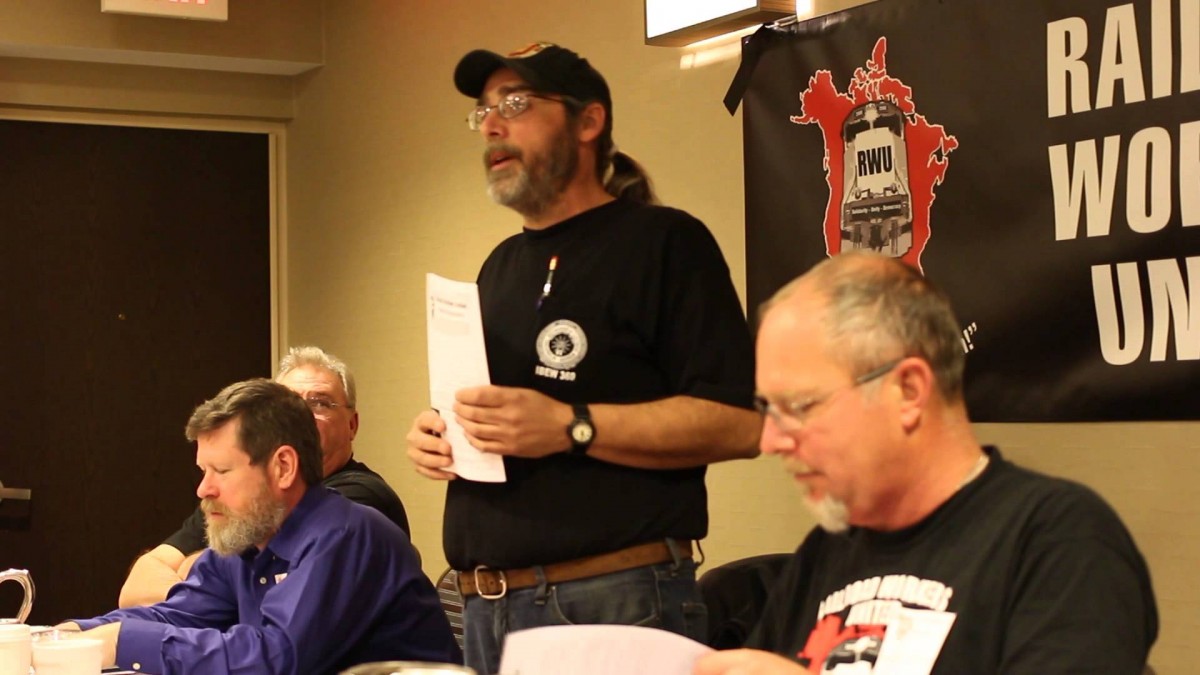
In this ongoing series, “From the Ground Up,” Occupy.com joins with Commonomics USA in presenting stories of local struggles for a new, sustainable economy.
Trains have the ability to move America into a post-carbon economy with fewer cars, cleaner air and stronger communities. But railroad bosses are telling their workers they have to support more oil and coal extraction, and faster, more dangerous train routes in order to keep their jobs.
John Paul Wright is concerned about this contradiction. The husband and father is a locomotive engineer, union and labor organizer, and a singer of protest songs. As the national lead organizer for [Railroad Workers United](http://railroadworkersunited.org/] and a member of the organization’s steering committee, part of his job is bringing together railroad unions who’ve been told by the bosses that they have incompatible views and interests. “This is the very nature of big business craft unionism,” he tells me. “The workers are caught in the middle.”
Wright says that “the railroad could be the most efficient way to move anything we move today. But we’ve been sold on an economy that doesn’t represent our best interests.”
Part of our job as storytellers and advocates for a new economy is to articulate how the interests of working people converge with those of a healthy and just planet. Trains are a crucial part of that picture. “The railroads built the small towns, passenger service was the transportation policy before cars,” Wright says, “and small farming communities had access to larger markets.”
But now, the trains and often the land on which they travel are owned by big corporations. “So us workers are forced to move whatever America wants. We move coal, oil, products from sweatshops overseas, fertilizer, plastics, etc,” he says. All because corporate capitalism “sees no profit in a transportation policy built on service and access.”
This isn’t just the market following around people’s preferences like a faithful dog. The story of the decline of public transportation and railways is one of criminal manipulation by capitalists, not honest brokering. In the first half of the 20th century, a group of executives colluded to buy and literally dismantle the electric train systems in many of America’s major cities in order to artificially create a market for oil, cars, trucks and eventually an interstate system.
America’s public transit was like a Library of Alexandria for the United States: if it had survived and been regularly upgraded, we’d have quite a system today, one that would likely be transitioning to completely renewable power, as smaller nations are in the process of doing.
The potential ecological and socioeconomic benefits of rail are overwhelming. For transport of goods, trains are four times more fuel efficient than trucks. They also reduce highway gridlock, lower greenhouse gas emissions, and reduce pollution. For personal travel, trains emit on average between 80 and 90 percent less carbon output than airplanes per passenger.
Although some trains still run on diesel and oil, and a growing number of cars are hybrid or totally electric, trains could make the jump forward by going totally renewable, as they have in other countries. And a well-planned and executed mass transit system could make travel virtually free, replacing vehicles that are expensive to buy and maintain.
As usual it comes down to who makes the decisions: citizens and railway workers, or corporate shareholders and bosses. The corporations are in control now, and the results are unsafe trains that are about to become even less safe due to labor-saving proposals to decrease crew members; trains speeding through ecologically sensitive areas carrying lethal crude oil and frequently causing spills and explosions; and a passenger transit system that doesn’t come close to living up to its efficiency potential. Contrary to what the railway bosses are telling workers and the public, these issues are interrelated and must be part of an agenda for economic and ecological justice.
Downsizing Workers on Trains: Unsafe and Unsound
Leave it to big business to implement a plan that makes trains less safe and disempowers workers at the same time. The railroad companies have been trying to get away with using single employees to run trains for years. The unions and rail safety groups have pushed back strongly.
But now, corporate rail’s lobbying has put us dangerously close to this moment of deadly downsizing: on March 15, the Federal Railroad Administration proposed a rule that, while appearing to affirm two-person crews for necessary trains, actually provides a pathway for railway companies to claim that certain trains can function operated by single employees.
It’s a classic administrative Trojan Horse, and the railway workers aren’t buying it. Indeed, seven years ago, the Brotherhood of Locomotive Engineers and the United Transportation Union declared, in a joint petition on train crew staffing, that “no conditions exist where one-person operations are safe.”
Reading Railroad Workers United’s objections to single-employee operation, one remembers why union-led mines have so few accidents compared to nonunion ones: because workers care more about safety than owners, and experienced workers know a hell of a lot more about how to run their operations. RWU points out that crew members remind one another of safety imperatives, a practice that can’t really be mechanized or streamlined with existing technology.
Single-employee crews would have to stop their trains in order to process new instructions. They’d even have to stop the trains to go to the restroom. Backing trains up in reverse would become much less safe. Distractions would get more dangerous.
The list of safety concerns goes on, but there’s something else going on too. It’s about capital and labor, and the rail workers’ pushback is also against capital’s drive to dominate economic and social relationships. “The railroad companies make an argument that there is no data to prove the one person trains are safer that two person trains,” Wright says. “There is no data because on a large scale, in freight, there have been no one person trains operated. It’s profits: this is the lone issue for the railroads. Period.”
Matt Stannard is policy director at Commonomics USA and a member of the Public Banking Institute’s board of directors. This is the first of a two-part series. Read Part II next week.
If you like what you read and want to see more original reporting on Occupy.com, donate today!
3 WAYS TO SHOW YOUR SUPPORT
- Log in to post comments












